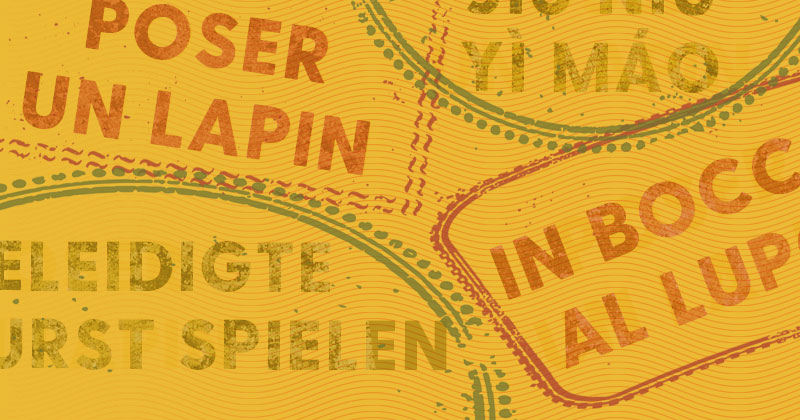


Lost in Translation
Language profs present: Colorful idioms from around the world
March 28, 2023
The University of Delaware is one of the only universities in the nation to offer a three language major, meaning undergraduates can conjugate verbs, diagram sentences and learn proficiency in not one but three… tres… trois… drei… thalatha… you get the idea... languages. Fluency has been a priority at the University ever since that first study abroad trip 100 years ago, which included an intensive French curriculum.
So, why does the institution place so much value on the pursuit? Research shows understanding a foreign language increases marketability—between 2016 and 2021, the number of U.S. job postings targeting bilingual applicants tripled. But beyond professional success, acquiring this skill has world-changing potential. “It establishes a common humanity,” says Persephone Braham, professor of Spanish as well as Latin American and Iberian studies. “A lot of the xenophobia in this country is coming from a place of fear. But once you can defend yourself in a foreign language—have an argument, get around, negotiate or bargain—you become less afraid. And that is key to functioning as a U.S. citizen in a changing world.”
To help kickstart your own foreign language journey, Blue Hen experts have provided their favorite, most colorful idioms from around the globe. Because when it comes to speaking in a foreign tongue, the last thing you want is estar pez (to be a fish who knows nothing).
From Italian Prof. Laura Salsini: In bocca al lupo
Translation: In the mouth of the wolf
Meaning: Said to people needing a bit of luck. (Reply with crepi lupo: “May the wolf die.”)
Example: La professoressa dice sempre 'in bocca al lupo' agli studenti prima di un esame; The professor always wishes her students ‘in the mouth of the wolf’ before an exam.
From Chinese Prof. Jianguo Chen: 对牛弹琴
Translation: Play the harp to a cow
Meaning: To explain something complicated to a simpleton, or present something valuable to an audience incapable of understanding its worth
Example: 杰瑞弥试图解释勇猛蓝鸡美式足球队最后一次护球回传的重要性。但是对方一脸茫然神色的表情告诉他他的努力完全徒劳无益,纯粹是对牛弹琴; Jeremy tried to explain the significance of the Fightin’ Blue Hens last punt return, but a blank stare let him know he was playing the harp to a cow.
From French Prof. Ali Alalou: poser un lapin
Translation: Put a rabbit to someone
Meaning: To stand someone up
Example: Chaque fois qu'on se donne rendez-vous au Stone Balloon, Marie me pose encore un lapin; Every time we agree to meet up at the Stone Balloon, Marie puts me a rabbit again.
From German Prof. Iris Katharina Busch: die beleidigte Leberwurst spielen
Translation: To play the offended liver sausage
Meaning: To be unnecessarily offended
Example: Ich wollte meinem Mitbewohner beibringen, dass er sein Stinktier nicht mit in unser Wohnheim bringen kann, aber er hat die beleidigte Leberwurst gespielt!; I tried explaining to my roommate that he couldn’t bring his pet skunk into our dorm, but he played the offended liver sausage!
From Aussie Prof. Rachael Hutchinson: I’ve been flat out like a lizard drinking
Translation: I’ve been flat out like a lizard drinking
Meaning: To be exceptionally busy
Example: Between studying for my biomedical engineering final and prepping for my study abroad trip down under, I’ve been flat out like a lizard drinking!
Contact Us
Have a UDaily story idea?
Contact us at ocm@udel.edu
Members of the press
Contact us at 302-831-NEWS or visit the Media Relations website


